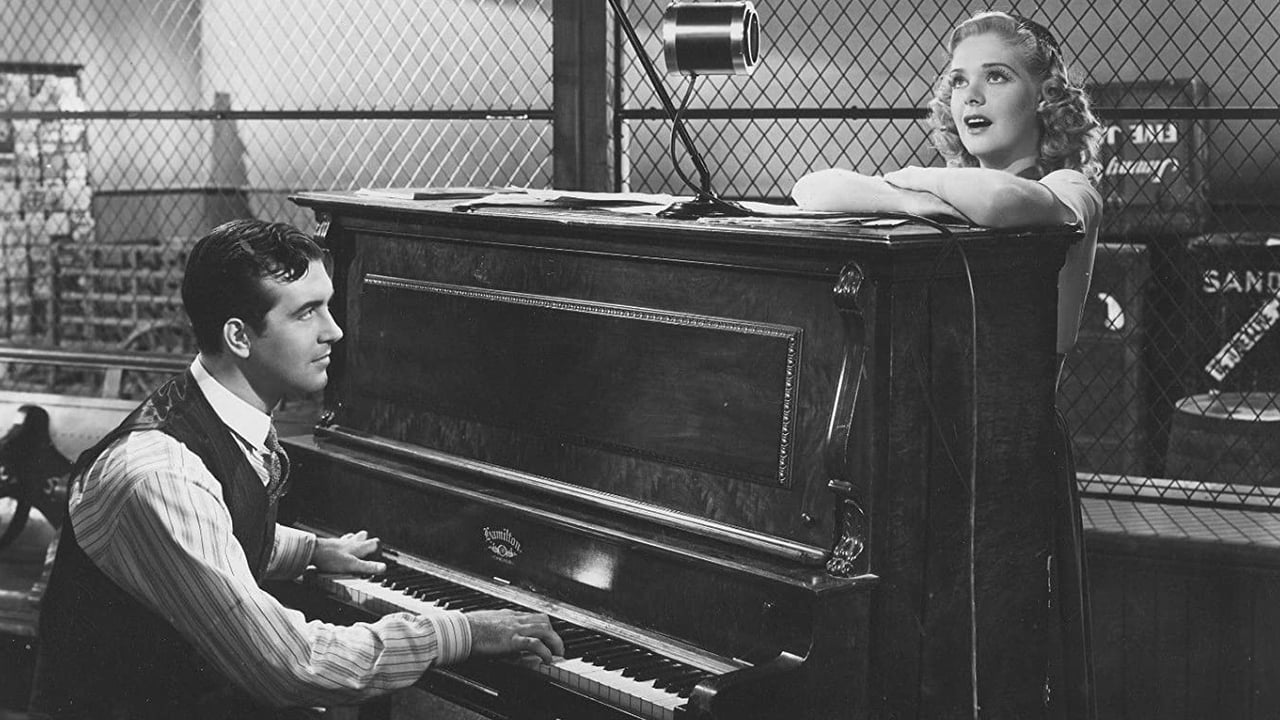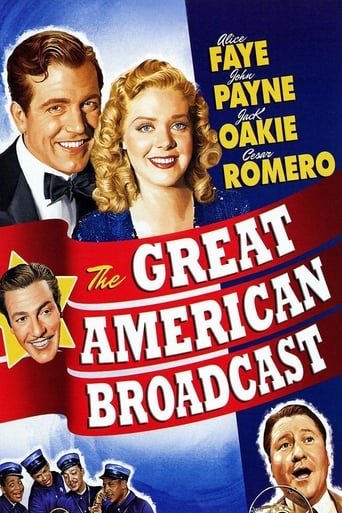

Very well executed
... View MoreGreat visuals, story delivers no surprises
... View MoreI didn’t really have many expectations going into the movie (good or bad), but I actually really enjoyed it. I really liked the characters and the banter between them.
... View MoreBlistering performances.
... View MoreYou know those Fox musicals: dreary plots, dragged-out playing times, benumbed direction, uninteresting photography, excruciatingly familiar casts, undistinguished or antiquated old-fave scores. This one, with less production values than usual, actually has a fun if unremarkable plot, pretending to be about the history of radio, but really just an excuse to let its stars do what they do best: Alice Faye to sing in her throaty, comforting contralto, John Payne to look handsome (he also warbles a bit, and not badly), Jack Oakie to clown (less annoyingly than usual). Mack Gordon and Harry Warren wrote many gorgeous ballads; here the keeper is "Long Ago Last Night," and it's a corker. It moves fast--positively at a gallop, by Fox standards--and though there are anachronisms everywhere, in the costumes and the dialog and the sets, this time you don't mind. A very entertaining, unpretentious Fox musical.
... View MoreEven back in the early 1940s when MGM was dazzling the world with their spectacular Technicolor musicals, Twentieth Century Fox under Daryl Zanuck's direction was still turning out modest B&W musicals like this one about the early days of radio. No breath-taking dance numbers but lots of pretty if ultimately forgettable songs by Mack Gordon and Harry Warren, enjoyable specialty numbers by the Ink Spots and the incomparable Nicholas Brothers (as railroad porters!); and even a parody radio commercial sung with German accents by those madcap expatriates from the Berlin cabarets, the Wiere Brothers (the poor man's Ritz Bros.) The fast-moving plot is expertly directed by the usually lethargic Archie Mayo with lots of gags and even a bit of pathos from Jack Oakie, and enough romance between handsome John Payne and adorable Alice Faye to keep the girls in the audience happy. Fans of big studio high-style glamor cinematography will enjoy the gorgeous close-ups of Alice Faye lit by J.P. Marley and Leon Shamroy. Mike Frankovitch, who was one day to become president of Columbia Pictures, can be seen briefly as a radio announcer.
... View MoreFor those of us lucky enough to see Turner Classic Movies library of great MGM, Warners and RKO pictures, it comes as a letdown to see comparable 20th Century Fox pictures done with such juvenile plots--and there were many.The Great American Broadcast is worthwhile to see gorgeous Alice Faye (about the time she married Phil Harris), hear her great songs, see the incomparable Ink Spots, Weire Brothers and Nicholas Brothers! Also performing well in restrained character for a change is Jack Oakie.The backdrop of early radio is interesting, but the plot was so bad I had to turn away for a while--like broadcasting from a building rooftop from a tent in a thunderstorm(early AM low power radio would never reach far with all that lightning and static), also preposterous that John Payne would leave his beautiful new bride Alice Faye and run away to south america....only to have Jack Oakie beat him up to get him to look at her in the end....ha!!Thanks to the Fox Classic Movie Channel for providing a beautiful print, enjoy it just the same.
... View MoreFew middle-aged people now even remember the waning days of big time network radio, much less its prime time from the late 1920s to the mid 50s. When I first became aware of radio, about 1930, the networks had been operating for some time. Nothing in this movie would tell me how long. The signals were, indeed, carried over telephone lines. In fact, by the late 30s, at least, telephone cables consisting of thousands of wires in a lead sheath carried larger gauge wires in the center to provide a cleaner signal for radio transmission. Broadcasts originated mostly in New York, with quite a few from California, some from Chicago, and a few from other places around the country -- like Nashville. If it was necessary to switch the feed from, say, New York to Hollywood for a special interview, it took about 5 seconds for the phone lines to be reconnected in the opposite direction. It was a fun time, that this movie pretends to have invented. When it originated, the people -- broadcasters and listeners -- must have been fully as excited about it as the movie depicts.The plot of the story is one we've seen in at least a dozen films: boy steals friend's girl; friend and girl succeed big in some enterprise, boy, left out, becomes jealous and disappears; boy turns up just in time to observe girl's ultimate triumph. The enterprise may be a business, a farm, or a mine, but more commonly it's an act or dramatic career. The story is always stupid, and this film is no exception.Still, the music featuring Alice Faye, a couple of numbers by the Ink Spots, the hilarious Wiere Brothers, and the incomparable Nicholas Brothers, and even John Payne in one of his early singing roles, makes for eminently watchable entertainment, with the bit of questionable broadcast history thrown in for good measure. Despite the too familiar plot, it's far better than the average musical of the 30s through 50s. I loved it enough to save the recording I made off the cable 15 years ago, and liked it just as much when I dug up the tape this week.
... View More